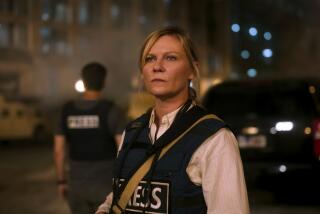Movie review: ‘Agora’ shows the true casualty of war
- Share via
“Agora” is a historical epic with an impressive pedigree. It misses some emotional connections and has pacing problems but covers a fascinating, overlooked period while depicting the eternal struggle between science and ideology.
Alejandro Amenábar’s film is set during Alexandria’s transition from center of enlightenment to crumbling outpost on the edge of the Dark Ages. Chief among the storied figures driving the drama is the celebrated mathematician and astronomer Hypatia ( Rachel Weisz); an isosceles love triangle forms as one of her students (later a high official) and one of her slaves (later a religious extremist) pine for her.
Weisz is persuasive as the perpetually searching scholar and Ashraf Barhom (“The Kingdom”) is charismatic and menacing as a zealot. There are memorable moments, as when a onetime minority’s switch from oppressed to oppressor is conveyed in a single scene involving firewalking and public humiliation. It’s particularly painful to see the famous library, the greatest repository of human learning, wrecked by a mob and converted to a barn.
Amenábar (“The Sea Inside,” “The Others”) is a skilled director, but in his first film of this scale he loses subtleties that made his other works so potent. The subject is absorbing, but the lack of differentiation in dramatic levels makes the film feel longer than its 126 minutes (15 shorter than its Cannes version).
Last year’s highest-grossing film in Amenábar’s native Spain, “Agora” has drawn criticism from Catholic organizations for perceived slights against Christians, but its lack of condemnation of specific dogma makes the film’s target seem to be fundamentalism in general. “Agora” is about many things, including Hypatia’s pursuit of the secrets of heavenly orbits and the frequent fate of intellectual women in rigidly paternalistic societies. But the primary tragedy conveyed is that one of the casualties in a war of ideologies is knowledge.
“Agora.” MPAA rating: Unrated. Running time: 2 hours, 6 minutes. At the Landmark, West L.A.
More to Read
Only good movies
Get the Indie Focus newsletter, Mark Olsen's weekly guide to the world of cinema.
You may occasionally receive promotional content from the Los Angeles Times.











